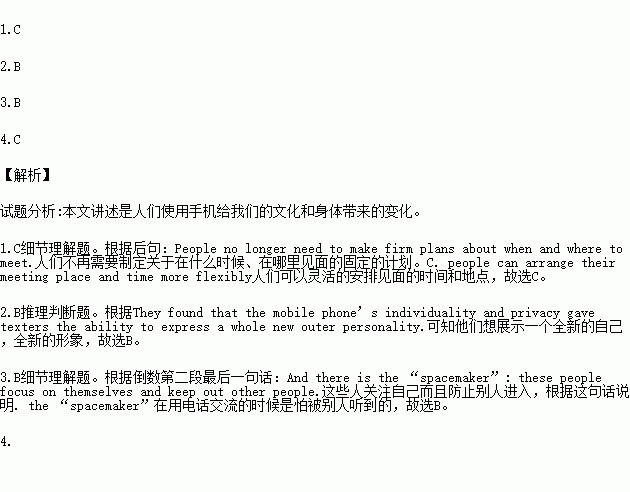题目内容
Change is everything in the case of mobile phones. Recent research indicates that the mobile phone is changing not only our culture, but our very bodies as well.
First, let’s talk about culture. The difference between the mobile phone and the fixed-line phone, is that a mobile number corresponds to a person, while a fixed-line phone goes to a place. If you call my mobile, you get me. If you call my fixed-line phone, you get whoever answers it.
This has several implications(含义). The most common one, however, and perhaps the thing that has changed our culture forever, is the “meeting” influence. People no longer need to make firm plans about when and where to meet. Twenty years ago, a Friday night would need to be arranged in advance. You needed enough time to allow everyone to get from their place of work to the first meeting place. Now, however, a night out can be arranged on the run. It is no longer “see you there at 8”, but “text me around 8 and we’ll see where we all are.”
Texting changes people as well. In their paper, “Insights into the Social and Psychological Effects of SMS (Short Message Service) Text Messaging”, two British researchers distinguished between two types of mobile phone users: the “talkers” and the “texters”-those who prefer voice to text messages and those who prefer text to voice.
They found that the mobile phone’s individuality and privacy gave texters the ability to express a whole new outer personality. Texters were likely to report that their family would be surprised if they were to read their texts. This suggests that texting allowed texters to present a self-image that differed from the one familiar to those who knew them well.
Another scientist wrote of the changes that mobiles have brought to body language. There are two kinds that people use while speaking on the phone. There is the “speakeasy”: the head is held high, in a self-confident way, chatting away. And there is the “spacemaker”: these people focus on themselves and keep out other people.
Who can blame them? Phone meetings get cancelled or reformed and camera-phones intrude(侵入)on people’s privacy. So, it is understandable if your mobile makes you nervous. But perhaps you needn’t worry so much. After all, it is good to talk.
1.The “meeting” influence of a mobile phone refers to the fact that ________.
A. people are able to meet someone at any place and any time
B. people have to make a firm plan about when and where to meet
C. people can arrange their meeting place and time more flexibly
D. people have to attend more phone meetings than ever before
2.We can infer from Paragraph 5 that the texts sent by texters probably are ________.
A. showing popular images to others
B. showing new images to others
C. showing the same images to others
D. showing familiar images to others
3.According to the passage, who is afraid of being heard while talking on the mobile?
A. talkers B. the “spacemaker”
C. the “speakeasy” D. texters
4.Which of the following can be the best title of the passage?
A. The Influence of Short Message Service B. Changes in the Use of the Mobile
C. Changes Caused by Mobile Phone Use D. Body Language and the Mobile Phone
 课堂全解字词句段篇章系列答案
课堂全解字词句段篇章系列答案 步步高口算题卡系列答案
步步高口算题卡系列答案 点睛新教材全能解读系列答案
点睛新教材全能解读系列答案

